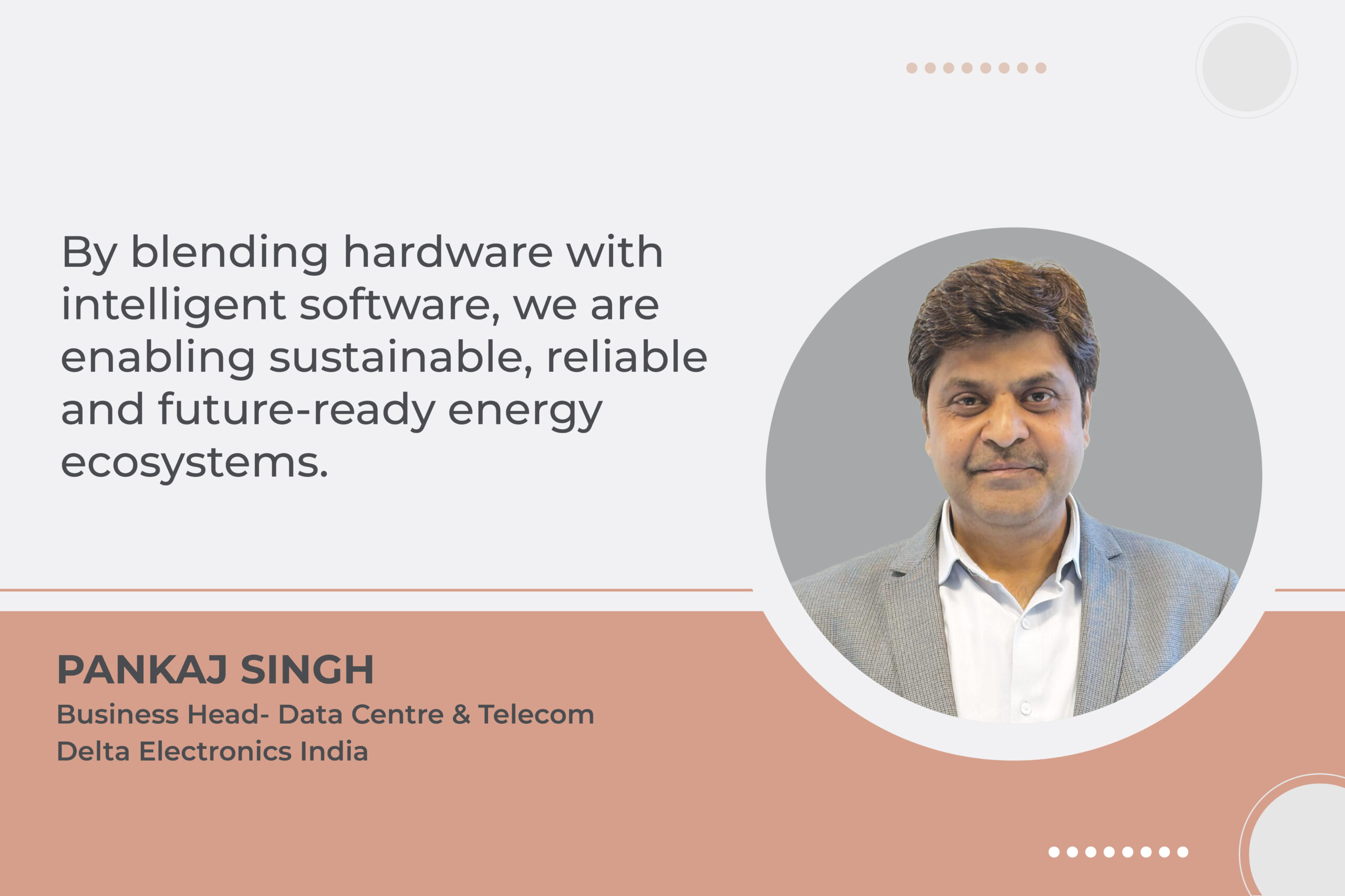Delta Electronics delivering smarter power solutions for connected world
By Staff Report September 24, 2025 7:50 pm IST
By Staff Report September 24, 2025 7:50 pm IST

By blending hardware with intelligent software, Delta is enabling sustainable, reliable and future-ready energy ecosystems.
Delta Electronics is harnessing AI to transform its energy business with smarter power management, predictive maintenance and digital twin simulations. In data centres, AI drives advanced cooling, modular UPS, and energy storage solutions to reduce costs and carbon footprint. Pankaj Singh shares that by blending hardware with intelligent software, Delta is enabling sustainable, reliable and future-ready energy ecosystems. Let us know more about him.
How are modern UPS systems evolving from passive backups to intelligent, AI-driven energy assets for grid stability?
With the rise of microgrids and decentralised generation, UPS systems are evolving from passive backup devices into active, intelligent energy assets. It is capable of managing bidirectional power flows while integrating with renewable energy sources and contributing to grid stability.
There are several notable impacts of microgrids and decentralised generation on UPS systems. This includes a shift from a standalone to an integrated role. Traditional UPS systems were primarily designed for short-term backup in the event of a grid failure. With the evolution of microgrids and distributed generation (solar, wind, and fuel cells), UPS systems are now being integrated into a broader energy ecosystem, acting not just as emergency backups.
Modern UPS designs are evolving to support bidirectional energy flow, enabling them to feed excess stored energy back into the microgrid. This capability allows UPS systems to stabilise local voltage and frequency, effectively functioning as mini energy storage systems (ESS) that provide both backup power and active grid support.
Talking of smarter, AI-driven energy management, AI enables UPS systems to make real-time decisions on when to draw from batteries, when to supply the microgrid and when to recharge. Predictive analytics allows UPS units to anticipate demand surges or renewable intermittency, ensuring seamless power quality.
Additionally, UPS systems are increasingly integrated with Battery Energy Storage Systems (BESS) in decentralised setups. Rather than remaining idle until an outage, these UPS systems actively optimise renewable energy usage, helping to reduce peak demand charges and enhance overall system resilience.
When we speak of scalability and modular designs, the decentralised energy setups require modular UPS systems that can be scaled with the microgrid’s growth. Compact, high-efficiency lithium-ion–based UPS solutions are being adopted for commercial and industrial microgrids.Ultimately, considering resilience and cybersecurity, UPS systems become interconnected with IoT and grid controllers, where cybersecurity and interoperability become key design concerns.
How is AI transforming UPS systems into intelligent, self-learning solutions for efficiency and predictive maintenance?
AI is behind the revolution in UPS systems, facilitating predictive maintenance and smarter performance optimisation. Equipped with IoT sensors, UPS units now collect real-time data on battery health, load patterns and component conditions. AI algorithms analyse this data to predict potential failures, allowing maintenance teams to act before breakdowns occur and ultimately reducing downtime and costs. Beyond reliability, AI also optimises performance by forecasting demand, adjusting charging cycles and managing energy flows in hybrid setups with renewables and storage. This shifts the role of UPS from a passive backup solution into an intelligent, self-learning energy asset that ensures efficiency, resilience and sustainability.
How are modular UPS systems helping Indian businesses achieve scalability and resilience amid growth?
The rising demand for modular UPS architectures in India is boosted by businesses seeking greater flexibility, scalability and cost efficiency. Unlike traditional monolithic systems, modular UPS systems allow enterprises to start with the capacity they need and expand seamlessly as demand grows, without requiring major infrastructure overhauls. This pay-as-you-grow model is particularly attractive for data centres, the BFSI sector, healthcare, and manufacturing sectors, where load requirements fluctuate. It also improves uptime, as faulty modules can be replaced without requiring a system shutdown. By offering agility, higher efficiency and resilience, modular UPS systems are enabling Indian businesses to adapt quickly to digital and operational growth.
How is your company leveraging advanced local semiconductors to enhance UPS performance and reliability in India?
Our company is closely aligning with the Central Government’s semiconductor mission by adopting advanced, locally available chip technologies to enhance UPS performance. By integrating next-generation semiconductors, such as silicon carbide (SiC) and gallium nitride (GaN), we are improving power conversion efficiency, reducing heat losses, and enabling more compact and modular designs. This supports the government’s vision of building a resilient semiconductor ecosystem. This ensures our UPS systems deliver higher reliability for data centres, BFSI, manufacturing and other digital-first sectors. Ultimately, this alignment strengthens India’s digital economy by providing energy-efficient, future-ready power backup solutions tailored for rapid growth.
We use cookies to personalize your experience. By continuing to visit this website you agree to our Terms & Conditions, Privacy Policy and Cookie Policy.